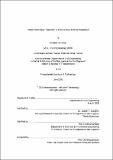Transit preferential treatment : a public policy-making perspective
Author(s)
Pulichino, Michael, 1979-
DownloadFull printable version (3.498Mb)
Other Contributors
Massachusetts Institute of Technology. Dept. of Civil and Environmental Engineering.
Advisor
Joseph F. Coughlin.
Terms of use
Metadata
Show full item recordAbstract
Buses and in general at-grade public transportation remain the most important component of transit services in all the urban areas, whether they are feeder to a heavy rail system or an independent network. However, the steady increase in travel demand, essentially private automobile, has results in a growing level of congestion, affecting both cars and public transportation. In response, cities like Curitiba and Zurich moved in the late 70's towards the implementation of preferential treatment. To do that, they introduced innovative policies in order to give the full priority to transit. Preferential treatment is a broad definition that combines all the means to insure that priority is given to transit (queue jump, traffic signal priority, exclusive lane, tramways ...). The main concerns about Zurich and Curitiba are that they both achieved their implementation through particular policymaking processes; moreover the generalization of these types of policies has been very limited. The objectives of this thesis are to apply the three models from the agenda-building theory (Mobilization, Inside Access and Outside Initiative) to the context of public transportation to understand how innovative policy-making can be introduced and if the presence of a policy entrepreneur is necessary and sufficient. Using 11 cities in Europe and America that have implemented preferential treatment as case studies, the thesis identified elements necessary to address the public reaction, the institutional fragmentation and the decision-makers' positions. The research shows the necessity of public consultations and comprehensive planning exercises to convince the different stakeholders. Moreover, it points out the benefits of initiatives such as benchmarking or national legislation. Eventually, the thesis concludes that the policy-making theory can be expanded in acknowledging a combination of models to describe the preferential treatment's implementation process. On the other hand, the context of public transportation has evolved enough (concentration of decision powers and increasing public support) so that transit agencies can move towards implementation in focusing on stakeholder management strategies instead of relying on a policy entrepreneur.
Description
Thesis (S.M.)--Massachusetts Institute of Technology, Dept. of Civil and Environmental Engineering, 2003. This electronic version was submitted by the student author. The certified thesis is available in the Institute Archives and Special Collections. Includes bibliographical references.
Date issued
2003Department
Massachusetts Institute of Technology. Department of Civil and Environmental EngineeringPublisher
Massachusetts Institute of Technology
Keywords
Civil and Environmental Engineering.